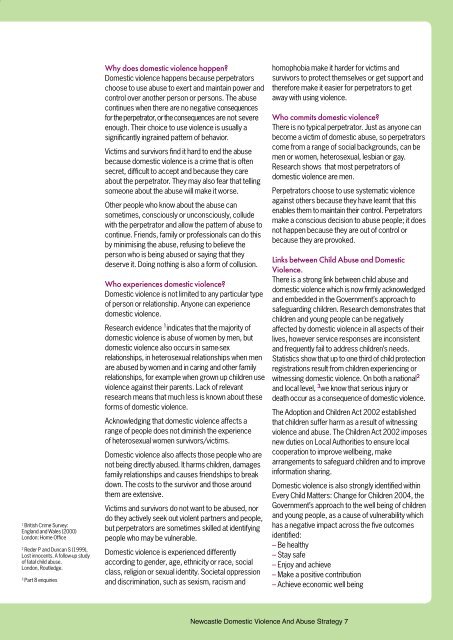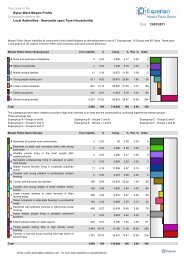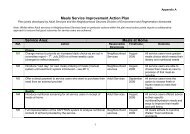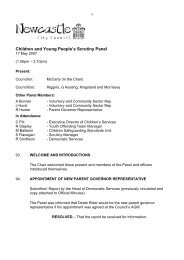Safe Newcastle Domestic Violence Strategy - Newcastle City Council
Safe Newcastle Domestic Violence Strategy - Newcastle City Council
Safe Newcastle Domestic Violence Strategy - Newcastle City Council
You also want an ePaper? Increase the reach of your titles
YUMPU automatically turns print PDFs into web optimized ePapers that Google loves.
1<br />
British Crime Survey:<br />
England and Wales (2000)<br />
London: Home Office<br />
2<br />
Reder P and Duncan S (1999),<br />
Lost innocents. A follow-up study<br />
of fatal child abuse.<br />
London, Routledge.<br />
3<br />
Part 8 enquiries<br />
Why does domestic violence happen?<br />
<strong>Domestic</strong> violence happens because perpetrators<br />
choose to use abuse to exert and maintain power and<br />
control over another person or persons. The abuse<br />
continues when there are no negative consequences<br />
fortheperpetrator,ortheconsequences are not severe<br />
enough. Their choice to use violence is usually a<br />
significantly ingrained pattern of behavior.<br />
Victims and survivors find it hard to end the abuse<br />
because domestic violence is a crime that is often<br />
secret, difficult to accept and because they care<br />
about the perpetrator. They may also fear that telling<br />
someone about the abuse will make it worse.<br />
Other people who know about the abuse can<br />
sometimes, consciously or unconsciously, collude<br />
with the perpetrator and allow the pattern of abuse to<br />
continue. Friends, family or professionals can do this<br />
by minimising the abuse, refusing to believe the<br />
person who is being abused or saying that they<br />
deserve it. Doing nothing is also a form of collusion.<br />
Who experiences domestic violence?<br />
<strong>Domestic</strong> violence is not limited to any particular type<br />
of person or relationship. Anyone can experience<br />
domestic violence.<br />
Research evidence 1 indicates that the majority of<br />
domestic violence is abuse of women by men, but<br />
domestic violence also occurs in same-sex<br />
relationships, in heterosexual relationships when men<br />
are abused by women and in caring and other family<br />
relationships, for example when grown up children use<br />
violence against their parents. Lack of relevant<br />
research means that much less is known about these<br />
forms of domestic violence.<br />
Acknowledging that domestic violence affects a<br />
range of people does not diminish the experience<br />
of heterosexual women survivors/victims.<br />
<strong>Domestic</strong> violence also affects those people who are<br />
not being directly abused. It harms children, damages<br />
family relationships and causes friendships to break<br />
down. The costs to the survivor and those around<br />
them are extensive.<br />
Victims and survivors do not want to be abused, nor<br />
do they actively seek out violent partners and people,<br />
but perpetrators are sometimes skilled at identifying<br />
people who may be vulnerable.<br />
<strong>Domestic</strong> violence is experienced differently<br />
according to gender, age, ethnicity or race, social<br />
class, religion or sexual identity. Societal oppression<br />
and discrimination, such as sexism, racism and<br />
homophobia make it harder for victims and<br />
survivors to protect themselves or get support and<br />
therefore make it easier for perpetrators to get<br />
away with using violence.<br />
Who commits domestic violence?<br />
There is no typical perpetrator. Just as anyone can<br />
become a victim of domestic abuse, so perpetrators<br />
come from a range of social backgrounds, can be<br />
men or women, heterosexual, lesbian or gay.<br />
Research shows that most perpetrators of<br />
domestic violence are men.<br />
Perpetrators choose to use systematic violence<br />
against others because they have learnt that this<br />
enables them to maintain their control. Perpetrators<br />
make a conscious decision to abuse people; it does<br />
not happen because they are out of control or<br />
because they are provoked.<br />
Links between Child Abuse and <strong>Domestic</strong><br />
<strong>Violence</strong>.<br />
There is a strong link between child abuse and<br />
domestic violence which is now firmly acknowledged<br />
and embedded in the Government’s approach to<br />
safeguarding children. Research demonstrates that<br />
children and young people can be negatively<br />
affected by domestic violence in all aspects of their<br />
lives, however service responses are inconsistent<br />
and frequently fail to address children’s needs.<br />
Statistics show that up to one third of child protection<br />
registrations result from children experiencing or<br />
witnessing domestic violence. On both a national 2<br />
and local level, 3 we know that serious injury or<br />
death occur as a consequence of domestic violence.<br />
The Adoption and Children Act 2002 established<br />
that children suffer harm as a result of witnessing<br />
violence and abuse. The Children Act 2002 imposes<br />
new duties on Local Authorities to ensure local<br />
cooperation to improve wellbeing, make<br />
arrangements to safeguard children and to improve<br />
information sharing.<br />
<strong>Domestic</strong> violence is also strongly identified within<br />
Every Child Matters: Change for Children 2004, the<br />
Government’s approach to the well being of children<br />
and young people, as a cause of vulnerability which<br />
has a negative impact across the five outcomes<br />
identified:<br />
– Be healthy<br />
– Stay safe<br />
– Enjoy and achieve<br />
– Make a positive contribution<br />
– Achieve economic well being<br />
<strong>Newcastle</strong> <strong>Domestic</strong> <strong>Violence</strong> And Abuse <strong>Strategy</strong>












